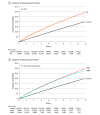Rheumatoid Arthritis and Risk of Depression in South Korea
- PMID: 38441894
- PMCID: PMC10915683
- DOI: 10.1001/jamanetworkopen.2024.1139
Rheumatoid Arthritis and Risk of Depression in South Korea
Abstract
Importance: Depression is among the most common comorbidities in rheumatoid arthritis (RA). There is a lack of data regarding the association of RA seropositivity and biologic agents with depression risk among individuals with RA.
Objective: To investigate the risk of depression following RA diagnosis among patients in South Korea.
Design, setting, and participants: This retrospective cohort study included 38 487 patients with RA and a comparison group of 192 435 individuals matched 1:5 for age, sex, and index date. Data were from the Korean National Health Insurance Service database. Participants were enrolled from 2010 to 2017 and were followed up until 2019. Participants who had previously been diagnosed with depression or were diagnosed with depression within 1 year after the index date were excluded. Statistical analysis was performed in May 2023.
Exposures: Seropositive RA (SPRA) was defined with the International Statistical Classification of Diseases and Related Health Problems, Tenth Revision (ICD-10) codes M05 and enrollment in the Korean Rare and Intractable Diseases program. Seronegative RA (SNRA) was defined with ICD-10 codes M06 (excluding M06.1 and M06.4) and a prescription of any disease-modifying antirheumatic drugs (DMARDs) for 270 days or more.
Main outcomes and measures: Newly diagnosed depression (ICD-10 codes F32 or F33).
Results: The mean (SD) age of the total study population was 54.6 (12.1) years, and 163 926 individuals (71.0%) were female. During a median (IQR) follow-up of 4.1 (2.4-6.2) years, 27 063 participants (20 641 controls and 6422 with RA) developed depression. Participants with RA had a 1.66-fold higher risk of depression compared with controls (adjusted hazard ratio [aHR], 1.66 [95% CI, 1.61-1.71]). The SPRA group (aHR, 1.64 [95% CI, 1.58-1.69]) and the SNRA group (aHR, 1.73 [95% CI, 1.65-1.81]) were associated with an increased risk of depression compared with controls. Patients with RA who used biologic or targeted synthetic DMARDs (aHR, 1.33 [95% CI, 1.20-1.47]) had a lower risk of depression compared with patients with RA who did not use these medications (aHR, 1.69 [95% CI, 1.64-1.74]).
Conclusions and relevance: This nationwide cohort study found that both SPRA and SNRA were associated with a significantly higher risk of depression. These results suggest the importance of early screening and intervention for mental health in patients with RA.
Conflict of interest statement
Figures


References
-
- GBD 2017 Disease and Injury Incidence and Prevalence Collaborators . Global, regional, and national incidence, prevalence, and years lived with disability for 354 diseases and injuries for 195 countries and territories, 1990-2017: a systematic analysis for the Global Burden of Disease Study 2017. Lancet. 2018;392(10159):1789-1858. doi:10.1016/S0140-6736(18)32279-7 - DOI - PMC - PubMed
MeSH terms
Substances
LinkOut - more resources
Full Text Sources
Medical

